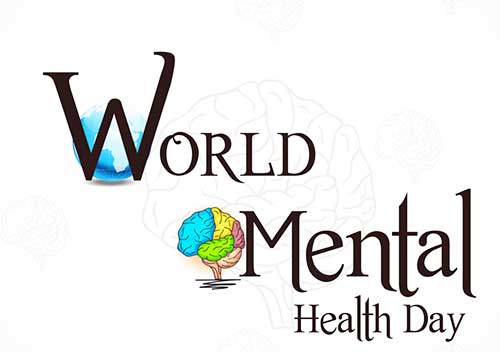
World Mental Health Day, observed annually on October 10th, is a global initiative to raise awareness about mental health issues and promote mental well-being. Spearheaded by the World Health Organization (WHO), this day encourages open conversations about mental health, challenges stigma, and advocates for better mental health services worldwide. It also serves as a reminder that mental health is just as important as physical health and that everyone deserves the support and care they need.
History and Significance
World Mental Health Day was first celebrated in 1992, initiated by the World Federation for Mental Health (WFMH). The day has grown in importance over the years, evolving into a global movement that highlights mental health concerns, ranging from depression and anxiety to more severe mental illnesses. Each year, the day focuses on a specific theme to address particular mental health issues, providing a platform for advocacy, education, and dialogue.
The significance of this day lies in its ability to bring attention to the often overlooked aspect of health—mental well-being. By dedicating a day to this cause, organizations and individuals around the world can raise awareness, break the stigma surrounding mental illness, and push for policy changes that prioritize mental health care.
The Global Mental Health Crisis
Mental health disorders are a growing concern globally, affecting millions of people across all demographics. Depression, anxiety, and stress-related disorders are among the most common issues, but many people also struggle with more severe conditions like bipolar disorder, schizophrenia, and post-traumatic stress disorder (PTSD). According to the WHO, one in four people will experience some form of mental illness during their lifetime.
The COVID-19 pandemic further exacerbated mental health challenges. Isolation, uncertainty, and financial stress have contributed to a significant rise in mental health issues globally. The pandemic highlighted the urgent need for accessible mental health services and the importance of integrating mental health support into primary health care.
Breaking the Stigma
One of the core objectives of World Mental Health Day is to combat the stigma associated with mental illness. Stigma often prevents individuals from seeking help or discussing their struggles, leading to untreated conditions and worsening mental health. Many cultures and societies still hold misconceptions about mental health disorders, viewing them as signs of weakness or moral failure.
By encouraging open conversations about mental health, World Mental Health Day helps normalize seeking help and highlights the importance of empathy and support. On this day, public awareness campaigns, social media movements, and community events are organized to share personal stories, provide mental health education, and create supportive environments where people feel safe talking about their mental well-being.
Access to Mental Health Services
While raising awareness is crucial, ensuring that people have access to proper mental health care is equally important. In many parts of the world, mental health services are either underfunded or inaccessible, leaving those in need without the necessary support. Many individuals face long waiting lists, high costs, or a lack of specialized care, making it difficult to manage their conditions.
World Mental Health Day advocates for improved access to mental health services, calling governments and healthcare providers to invest in mental health infrastructure. This includes training health professionals, expanding services in rural and underserved areas, and making mental health care affordable and inclusive.
The integration of mental health services into primary care is another key focus. By providing mental health support within general health services, individuals can receive holistic care without facing the stigma often associated with specialized mental health institutions.
Promoting Self-Care and Mental Well-Being
World Mental Health Day also emphasizes the importance of self-care in maintaining good mental health. Self-care practices, such as mindfulness, physical activity, healthy eating, and maintaining strong social connections, are critical in preventing mental health issues and enhancing overall well-being.
Encouraging individuals to prioritize their mental health through daily habits can have long-term benefits. Whether it's through meditation, journaling, regular exercise, or simply talking to friends and loved ones, self-care practices help manage stress, reduce anxiety, and improve mood.
The Role of Employers and Workplaces
Workplaces also play a crucial role in supporting mental health. High-stress levels, long hours, and workplace bullying can negatively impact an individual's mental well-being. On World Mental Health Day, employers are encouraged to create supportive work environments by offering mental health resources, promoting work-life balance, and addressing the mental health needs of their employees.
Many companies now recognize the importance of mental health in maintaining a productive and engaged workforce. Mental health days, flexible working hours, and employee assistance programs are just a few initiatives that employers can implement to support their teams.
The Future of Mental Health Advocacy
The focus on mental health continues to grow globally, but much work still needs to be done. World Mental Health Day serves as a reminder that mental health advocacy must remain a priority. Governments, healthcare institutions, educators, and communities need to work together to ensure that mental health is treated with the same urgency as physical health.
With greater awareness and investment, it is possible to create a world where mental health care is accessible to all and where individuals can seek help without fear of judgment or discrimination. The ongoing conversation sparked by World Mental Health Day is a crucial step toward achieving this goal.
Conclusion
World Mental Health Day is a vital observance that brings attention to mental health issues, promotes understanding, and calls for more significant investment in mental health services. This day significantly improves global mental well-being by breaking the stigma, raising awareness, and encouraging open dialogue. As mental health becomes a more prominent part of public health discussions, World Mental Health Day will continue to inspire change, foster empathy, and drive the global mental health agenda forward.
#WorldMentalHealthDay #WorldHealthOrganization #MentalHealthAwareness





